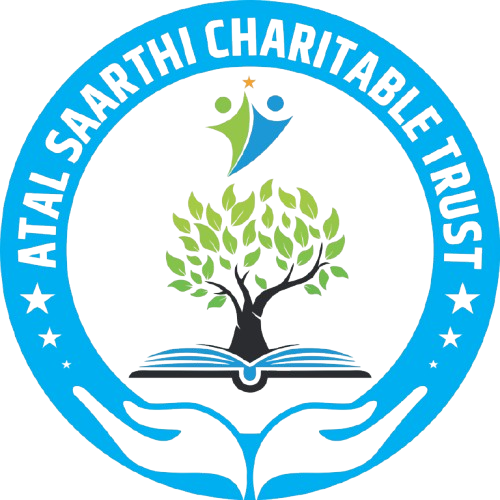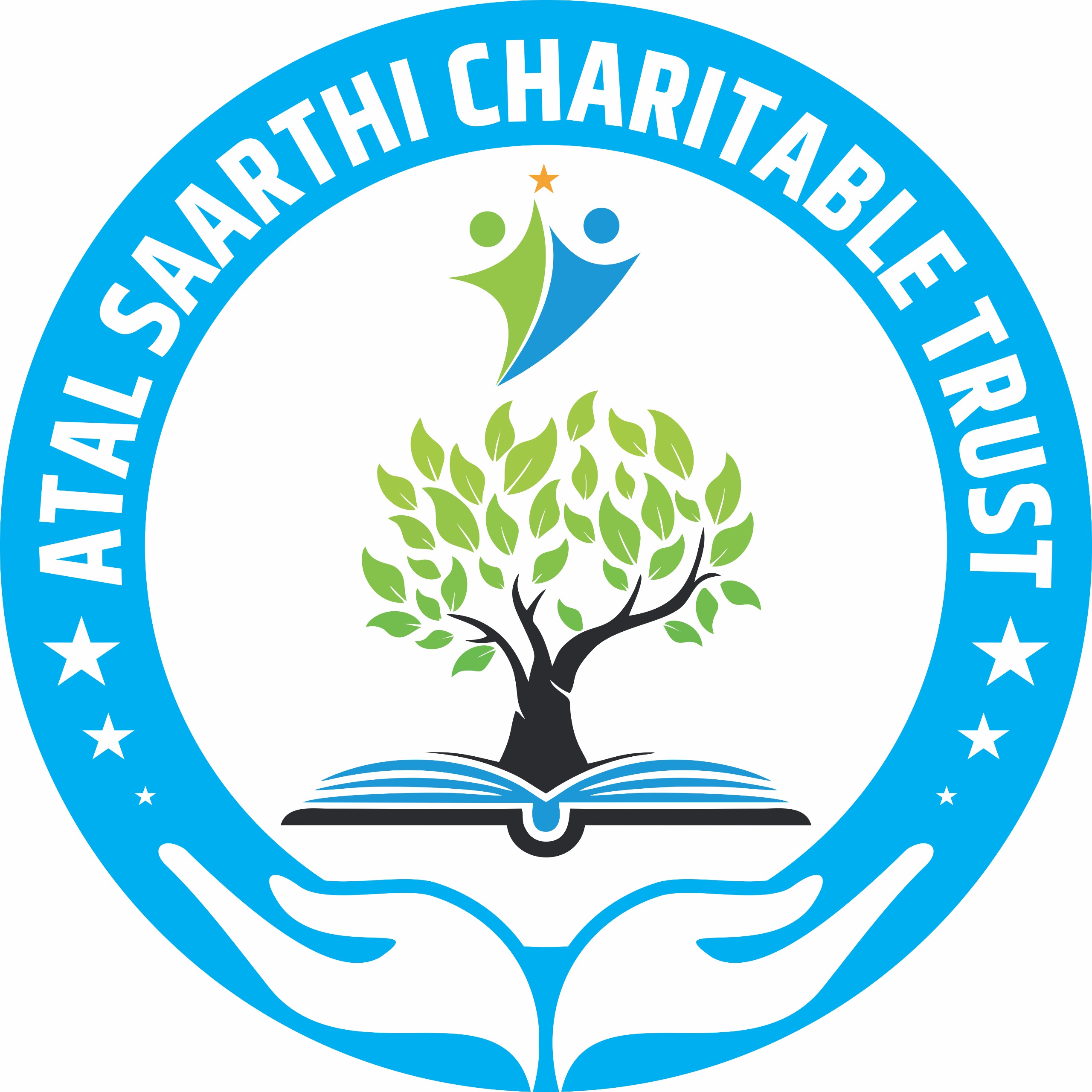Founder
Mr. Ashwani Kumar Sharma
Founder & Chief Trustee, Atal Saarthi Trust

A Journey That Began with Questions
Every great movement starts with someone asking difficult questions. For Mr. Ashwani Kumar Sharma, those questions came early and stayed with him throughout his life: Why do some children walk miles to school while others never get the chance to learn? Why do families in his village struggle to access basic healthcare that urban communities take for granted? Why do natural disasters devastate some communities for years while others recover quickly?
These weren’t abstract philosophical questions-they were lived realities he witnessed growing up in Taimourpur, a village in Bijnor district of Uttar Pradesh. The answers to these questions didn’t come from books or theories. They came from experience, observation, and most importantly, from listening to the stories of people around him.
Roots That Run Deep
Ashwani’s childhood was shaped by the rhythms of rural life-the collective effort during harvest season, neighbors supporting each other during difficult times, and the unspoken understanding that everyone’s wellbeing was interconnected. His family wasn’t wealthy, but they were rich in values that would later define his life’s work: compassion, integrity, and the belief that helping others isn’t just a good deed-it’s a responsibility.
His parents, simple hardworking people, taught him through their actions rather than words. He watched his mother share their modest meals with anyone who knocked on their door hungry. He saw his father take time off from his own work to help elderly neighbors with their fields. These weren’t grand gestures-they were everyday acts of kindness that planted seeds of service in young Ashwani’s heart.
The village school he attended was a single room with broken desks and a teacher who often didn’t show up. Yet, he was one of the fortunate ones who could attend at all. Many of his friends, especially the girls, stayed home to help with household work or farming. This early exposure to educational inequality left a lasting impression on him.
The Making of a Community Leader
As Ashwani grew older, he realized that individual acts of kindness, while important, could only go so far. Systemic problems required systematic solutions. During his college years, he began organizing small community initiatives-tutoring sessions for younger students, awareness campaigns about health and hygiene, and emergency support during crisis.
What set him apart wasn’t his formal education or any special training in social work. It was his genuine ability to connect with people across all social and economic divides. Whether talking to a struggling widow, a motivated young student, or a local government official, he had the rare gift of making everyone feel heard and valued.
His early twenties were spent learning the art of community mobilization. He discovered that real change happened not when outsiders imposed solutions, but when communities were empowered to identify and address their own challenges. This philosophy would later become central to Atal Saarthi’s approach.
Learning Through Service
Before Atal Saarthi Trust officially came into existence, Ashwani spent over a decade working informally with various community groups. He organized educational support for underprivileged children, helped families navigate government schemes, and facilitated healthcare camps in remote areas.
Each experience taught him valuable lessons. He learned that sustainable change requires patience, that every community has its own unique dynamics, and that the most effective programs are those designed with input from the people they’re meant to serve.
He also learned about the challenges of social work-the bureaucratic hurdles, the funding constraints, the occasional disappointments when well-intentioned projects didn’t deliver expected results. But rather than discouraging him, these challenges refined his approach and strengthened his resolve.
The Birth of Atal Saarthi
By 2020, it became clear that the informal network of volunteers and supporters Ashwani had built over the years needed a more structured approach to maximize their impact. The COVID-19 pandemic had created unprecedented challenges, and communities needed organized, reliable support systems more than ever.
The decision to establish Atal Saarthi Trust wasn’t made in a boardroom or during a formal meeting. It emerged from conversations with community members, fellow social workers, and supporters who had witnessed the effectiveness of Ashwani’s grassroots approach and wanted to scale it up.
The name “Atal Saarthi” was chosen carefully. “Atal” represents unwavering commitment-the kind of steadfast dedication needed for long-term social change. “Saarthi” means guide or charioteer-someone who helps others navigate their journey while respecting their autonomy and dignity.
When the trust was officially registered in 2021, it wasn’t a grand launch or celebration. It was simply the formalization of work that had been happening organically for years. The same values, the same people-first approach, the same commitment to community-driven solutions-now with a legal structure that could access more resources and create greater impact.
Leadership Style: Walking the Talk
Ashwani’s leadership philosophy is refreshingly simple: lead by example, stay connected to the ground reality, and never lose sight of why the work matters. While many organization leaders spend most of their time in offices or at conferences, he can regularly be found in the field-visiting project sites, talking with beneficiaries, and working alongside volunteers.
His typical day might include reviewing project reports in the morning, visiting a school where the trust has implemented an educational program in the afternoon, and spending the evening in community meetings planning the next initiative. He believes that leadership isn’t about having all the answers-it’s about asking the right questions and creating spaces where solutions can emerge from collective wisdom.
Those who work with him describe Ashwani as someone who listens more than he speaks, who remembers personal details about the families the trust serves, and who isn’t afraid to admit when something isn’t working. He has built a culture within the organization where feedback is welcomed, mistakes are treated as learning opportunities, and success is always measured by impact on communities rather than organizational metrics.
Personal Philosophy and Values
Ashwani often says that his work isn’t driven by charity in the traditional sense-it’s driven by justice. He believes that access to education, healthcare, and basic dignity shouldn’t depend on luck or circumstance. Every child deserves the chance to learn, every family deserves access to healthcare, and every community deserves the tools to build a better future.
This philosophy shapes every decision the trust makes. Programs are designed not to create dependency, but to build capacity. Support is provided with respect and dignity, recognizing that the people served by the trust are partners in creating change, not passive recipients of aid.
He’s particularly passionate about education, having seen firsthand how learning opportunities can transform not just individual lives but entire communities. The trust’s educational programs reflect his belief that education should be practical, relevant, and accessible to people of all ages and backgrounds.
Challenges and Growth
Building a charitable organization from scratch hasn’t been without its challenges. Ashwani has navigated funding constraints, regulatory requirements, and the complex dynamics of working with multiple stakeholders. There have been programs that didn’t achieve expected results, partnerships that didn’t work out, and moments of doubt about whether the approach was right.
But each challenge has contributed to the organization’s growth and his own development as a leader. He’s learned to balance idealism with pragmatism, to maintain high standards while being flexible in methods, and to stay focused on long-term goals while responding to immediate needs.
One of his proudest achievements isn’t any single program or project-it’s the network of trained volunteers and community leaders that has emerged through the trust’s work. These individuals carry forward the mission even in areas where the trust isn’t directly active, creating a multiplier effect that extends far beyond the organization’s formal reach.
Vision for the Future
When asked about his long-term vision, Ashwani speaks about creating a society where organizations like Atal Saarthi become unnecessary-not because problems don’t exist, but because communities have the knowledge, resources, and systems to address challenges independently.
He envisions a network of empowered communities where young people have access to quality education and meaningful employment, where families can access healthcare without financial hardship, where environmental sustainability is a way of life, and where social support systems are strong enough to help everyone through difficult times.
This vision drives the trust’s focus on capacity building and sustainability. Every program is designed with an exit strategy-a plan for how the community will continue the work independently once the trust’s direct involvement ends.
Personal Reflections
Despite his public role, Ashwani remains a deeply private person who draws strength from simple pleasures-morning walks through his village, conversations with elderly community members who share their wisdom, and quiet moments of reflection that help him stay grounded in his purpose.
He often credits his wife and family for their unwavering support, acknowledging that social work requires sacrifices not just from the individual but from their loved ones. His children have grown up understanding that their father’s work extends beyond conventional office hours and that their home is often filled with discussions about community challenges and solutions.
A Message from the Heart
“People sometimes ask me how I stay motivated when the problems seem so big and the resources so limited. The answer is simple-I’ve seen what’s possible when people come together with genuine intention to help each other. I’ve witnessed students from the most difficult circumstances excel in their studies when given proper support. I’ve seen communities recover from disasters stronger than before when they work together. I’ve watched elderly people regain their dignity when society creates space for their wisdom and experience.
The work we do at Atal Saarthi isn’t about heroic gestures or dramatic transformations. It’s about consistent, respectful support that helps people realize their own potential. We don’t save anyone-we simply provide tools, resources, and encouragement that allow individuals and communities to save themselves.
Every person who joins our mission, whether as a volunteer, donor, or partner, becomes part of a larger story-a story about ordinary people choosing to care for each other, about communities taking responsibility for their collective wellbeing, and about the quiet revolution that happens when compassion is organized into action.
This work has taught me that hope isn’t a feeling-it’s a practice. Every day, we choose to believe that things can get better, and more importantly, we choose to do something about it. We don’t wait for someone else to fix the problems we see. We roll up our sleeves and get to work, one family at a time, one community at a time, one act of service at a time.
The village where I grew up taught me that we’re all connected, that your wellbeing and mine are intertwined in ways we don’t always recognize. Atal Saarthi is my way of honoring that connection and ensuring that the values I learned in that small village in Uttar Pradesh can create ripples of positive change wherever they’re needed.
I invite you to join us not because we have all the answers, but because together, we can find better questions and create more effective solutions. The problems facing our communities are complex, but so is our capacity for compassion, creativity, and collective action.
Come, be a saarthi-a guide-in this journey toward a more just and caring world. Your unique talents, perspectives, and passion are exactly what this movement needs to grow and thrive.”
Join Ashwani’s Mission
Today, Mr. Ashwani Kumar Sharma continues to lead Atal Saarthi Trust with the same hands-on approach and community-centered vision that inspired its founding. He invites individuals from all backgrounds to discover how they can contribute to this growing movement of compassion and change.
“Real leadership isn’t about being in charge-it’s about taking care of those in your charge.” – Mr. Ashwani Kumar Sharma

